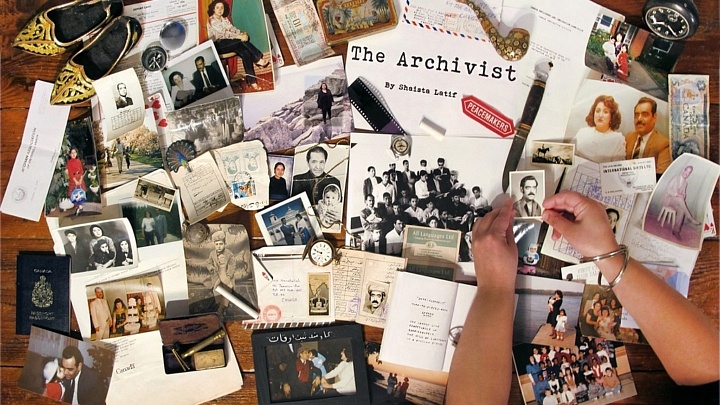For nearly two years, theatre lovers have felt entrapped in their own little purgatories. Artists have been unable to perform on stages, and audiences been...
Creating a 21st century archive: DART students respond to Shaista Latif’s The Archivist
Shaista Latif’s one-person production The Archivist came to St. Catharines as part of a southern Ontario tour in late February, 2020, produced by Why Not Theatre. Via Why Not, Latif reached out to BIPOC in Brock’s Department of Dramatic Arts and invited them to respond to the production – one of several recent gestures by BIPOC artists to address the dominance of Canadian theatre criticism by white voices and perspectives. Here is what two DART students wrote in response to Latif’s invitation.
Jordine de Guzman writes:
I went to see The Archivist when it played at the FirstOntario Arts Centre, and let me first say that it’s an experience unlike any other that I’ve had in a theatre. I’ve been to shows where the actors/performers open up to me through the text they were either given or wrote themselves, but Shaista Latif’s The Archivist found a way to welcome me into interacting with her soul and her history. I’m honestly kind of unsure how to review it because for me, it felt like less of a formal performance and more so a very pure form of sharing who she is. What do I have to say about honesty? Let me just ramble for a bit.
- As a person of colour living in this white-dominated city of St. Catharines, I had the weird experience of feeling privileged to be one of the people laughing the loudest at the jokes in that room.
- Seeing “A Whole New World” underscore a montage of bombings affected me in a way I’m not sure how to describe. I can’t say I haven’t been affected by war in my life, because I feel like everybody is, but I think that moment is one that will stay with me for a long time, as one where the concept and realization of war hit me hardest.
- Some people would consider work like this to be “about race”. However, I find that something The Archivist does very well is introduce to the audience the idea that plays “about race” are, at their core, also “about people”.
Jasmine Case writes:
I saw The Archivist at its Saturday afternoon showing in St. Catharines. I discovered after the Sunday show that while there were plenty of similarities between the showings, they were also quite different. As a woman of colour I connected with Shaista’s words early in the show. She came into the audience and asked if there were any people of colour. We were all sitting by one another and she came up to all of us and asked us what we say when we are asked the looming question all white people ask people of colour: “Where are you from?” She asked me specifically what I say to that, and I said that I’ll tell them that I’m from Canada, until I get to the specificity of the city I was born in. It can get to the point where I will just say “screw you” because it feels so rude for this question to be asked five times and for them to not get that I was born in Canada.
The show continued and it was nice to not feel like the “other” in the audience for once. Shaista was clear that she was a woman of colour and that she supported the other people of colour in the audience. In the show that I saw, she came into the audience and asked people if they believed in war. She only asked white people this question, so it was interesting to see their reactions. I heard that during another show she asked people what trauma was to them, and this didn’t go over well, from what I heard. We talk about making people feel uncomfortable in the theatre but people shouldn’t feel unsafe. Because I was not in this show I’m not sure how the audience felt; however, as an actor I would never want to make my audience feel unsafe because this breaks the trust between audience and actor. I feel she could have approached the audience in different ways, or altogether not asked the audience what trauma means to them because we can never know what they have been through in their lives. She could have gone about it a lot better than she did, rather than forcing audience members to participate.
That being said, it was great seeing her take back her power and tell everyone in the room that was exactly what she was doing.
Related Posts
Scenes from an Execution has opened, and even as someone working on it I was floored by how well the ambitious design turned out and how far the actors have...
As the first online Mainstage, Scenes from an Execution has the whole team live-streaming in from their homes. There is one cast member who is bridging an...
Scenes from an Execution has opened, and even as someone working on it I was floored by how well the ambitious design turned out and how far the actors have...
As the first online Mainstage, Scenes from an Execution has the whole team live-streaming in from their homes. There is one cast member who is bridging an...
Leave a Reply (Cancel Reply)
Twitter Feed
Blogroll
DARTcritics.com is partially funded by the Marilyn I. Walker School of Fine and Performing Arts, in support of student learning; experiential education; student professionalization; public engagement with the teaching, learning and production activities of the Department of Dramatic Arts; new ways of thinking; and the nurturing of links with our communities.





